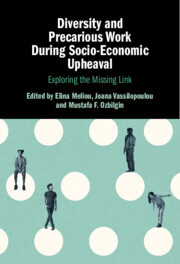Book contents
- Diversity and Precarious Work during Socio-economic Upheaval
- Diversity and Precarious Work during Socio-economic Upheaval
- Copyright page
- Contents
- Figures
- Contributors
- 1 Introduction
- 2 Pandemic Precarities and Gendered Biopolitics within the Neoliberal University
- 3 LGBTQ+ Individuals and Precarious Work
- 4 Age, Gender, and Precarity
- 5 How the (In)Ability of Using One’s Disability Strategically Reinforces Inequality and Precariousness amongst Disabled Workers
- 6 Classed and Gendered Experiences of Precarity in Dirty Work
- 7 Precarity and Diversity
- 8 Precarious Work in the Gig Economy
- 9 Refugees’ Vulnerability towards Precarious Work
- 10 Trapped in Precarious Work
- 11 How Precarity Is Threaded into Migration Rules
- 12 Culture, Precarity, and Dignity
- 13 Transforming Humanitarianism
- 14 Artificial Intelligence, the Gig Economy, and Precarity
- Index
- References
5 - How the (In)Ability of Using One’s Disability Strategically Reinforces Inequality and Precariousness amongst Disabled Workers
The Case of France
Published online by Cambridge University Press: 01 February 2024
- Diversity and Precarious Work during Socio-economic Upheaval
- Diversity and Precarious Work during Socio-economic Upheaval
- Copyright page
- Contents
- Figures
- Contributors
- 1 Introduction
- 2 Pandemic Precarities and Gendered Biopolitics within the Neoliberal University
- 3 LGBTQ+ Individuals and Precarious Work
- 4 Age, Gender, and Precarity
- 5 How the (In)Ability of Using One’s Disability Strategically Reinforces Inequality and Precariousness amongst Disabled Workers
- 6 Classed and Gendered Experiences of Precarity in Dirty Work
- 7 Precarity and Diversity
- 8 Precarious Work in the Gig Economy
- 9 Refugees’ Vulnerability towards Precarious Work
- 10 Trapped in Precarious Work
- 11 How Precarity Is Threaded into Migration Rules
- 12 Culture, Precarity, and Dignity
- 13 Transforming Humanitarianism
- 14 Artificial Intelligence, the Gig Economy, and Precarity
- Index
- References
Summary
This chapter presents three empirical studies on disabled individuals who use their disability strategically as they navigate the labour market. In our first case, we reveal that disabled employees in France reflect on factors on societal, organizational, and individual levels. More specifically, they determine whether the quota system can be used to their own advantage, decreasing their precarious position in the labour market. In the second case study, we draw on 257 qualitative surveys with individuals with mental health conditions in a variety of countries and outline how these individuals make their career choices. More specifically, we show how they self-select into sectors in which the characteristics related to their mental illness can be turned into an advantage. The third case presented highlights that disabled individuals use social comparison based on the characteristics of their disability when determining how they compare with other disabled workers. When they feel their disability characteristics are less stigmatizing than that of others, they tend to use this strategically, enhancing their own employability, securing less precarious employment. Through these three cases, we show the inequalities that exist within the population of disabled workers. More specifically, individuals with a disability in countries with less constraining disability legislation and individuals whose disability is more stigmatizing in nature are more likely to end up in employment that is characterized by low wages, few career development opportunities, little autonomy, and unstable or hazardous working conditions. Practical implications and avenues for future research are provided.
- Type
- Chapter
- Information
- Diversity and Precarious Work During Socio-Economic UpheavalExploring the Missing Link, pp. 79 - 98Publisher: Cambridge University PressPrint publication year: 2024

